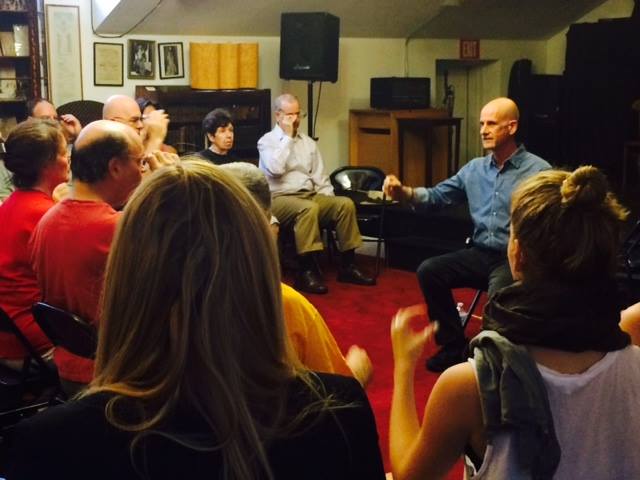 The Alexander Technique-Life Coaching for the body; Life Coaching-The Alexander Technique for the mind?
The Alexander Technique-Life Coaching for the body; Life Coaching-The Alexander Technique for the mind?
Coaching helps people break through their self-imposed shell, develop awareness of their mental habits, and make useful changes from the inside out. The Alexander Technique helps people break through their self-imposed physical shell, develop more awareness of their postural habits, and make useful changes from the inside out.
The Alexander Technique’s entryway and focus is primarily the body, and Coaching’s emphasis is the mind. The Alexander Technique and Coaching help people broaden their consciousness, develop awareness, expand their view, decrease their stress and pain, improve posture, presentation, poise, and pride.
Bi-directional neural pathways carry messages from the brain to the body, and from the body to the brain. The mind affects the body, the body affects the mind, and awareness, direction, and practice affects both. And, repetition builds muscle.
Mark Josefsberg-Certified Professional Coach
Certified Teacher of the Alexander Technique
(917) 709-4648










An interesting post. It reminded me of something FM said in the beginning of MSI, when he was introducing his ideas by. Relating the, to the New Thought. He said:
” have not found in the New Thought a proper consideration of cause and effect in treating the mental and physical in combination… the two must be considered entirely interdependent, and even more closely knit than is implied by such a phrase.”
And within two pages FM is stating that “the centre and backbone of my theory and practice, upon which I feel that I cannot insist upon too strongly, is that THE CONSCIOUS MIND MUST BE QUICKENED.” And from the context, it is clear that he is referring to conscious reasoning intelligence. (MSI, Irdeat edition, pp.35-6, p.39)
To my mind, the exciting thing about the Alexander Technique is that it takes the concept of psycho-physical unity seriously. But which aspect – the mental or the physical – did FM say was the centre and backbone of his theory and practice? So which one is our primary way in to helping the student?
Mark, this is a topic I keep thinking about myself… thank you for this post. Jennifer M., those quotes from MSI really made an impact on me, too. There’s another one (sorry, I don’t have the exact reference info. handy) in which F.M. insists that the mental attitude is of primary importance. It comes first. When I read that, I was shocked, considering the huge emphasis on mind-body unity throughout his books and in AT teachers’ teachings. Reading that helped me clarify to myself that, even though mind and body are indeed inseparable and we must always keep their unity in mind, they are not exactly the same thing. And this is in keeping with many other traditions, which emphasize the hierarchical importance of the mind over the body.
Hi Jennifer R.
“Mental attitude is of primary importance.” Thanks for that! I wonder what he meant. Is it the mental attitude in someone’s general demeanor and mood? Or is it the mental attitude toward learning, specifically the Alexander Technique, and to be open, to be willing to not know, to be willing to be wrong, etc.
On a different note, it’s really interesting to see all the latest research on embodied neuroscience, regarding how strongly the body effects the brain! I think it could further bolster the Alexander Technique’s role!
Here is the quote, from MSI, 2nd page of “Habits of Thoughts and of Body”: “When therefore we are seeking to give a patient conscious control, *the consideration of mental attitude must precede the performance of the act prescribed*.” This quote comes after a discussion which includes FM’s saying most people in mental asylums shouldn’t be there, and wouldn’t be if more attention had been paid to their mental attitude before it turned into uncontrollable habit. He gives the example of people who have “assumed a deliberate attitude to subserve a private end, such as the avoidance of uncongenial work, or the overindulgence of some desire or perverted sense…”
SO, I think “mental attitude” covers pretty much anything…it is what is going on in our minds…what we are thinking…and a “good” mental attitude would include having an open mind, I think!
Hi Jennifers M.
Thanks to both Jennifers for your very thoughtful replies!
“The mental and physical in combination.” Yes exactly. And, the conscious mind must be quickened.”
Does the Alexander Technique really take psycho-physical unity seriously? I guess it depends upon what we mean by the phrase. Here’s an example: If a student walks into a lesson with her neck much tenser than usual, and says her boss is driving her crazy, what would a coach or therapist do, and what would most Alexander Technique teachers do?
My guess is that most Alexander Technique teachers would listen for a bit, and then slowly start to help the Alexander student free her neck, her breathing etc. etc. This would be extremely helpful.
A coach might say, tell me more about your boss etc. etc., and try to examine her feelings of anger. In the process, her neck would free to some extent, and her breathing would change as she might start shifting her viewpoint.
Generally Alexander Technique teachers are not trained to delve into the psyche in any meaningful way. Again, our entryway is the body, and how to use the mind to think about the body.
Both entryways are extremely effective. To somehow combine the two would be the most effective way of all, in my opinion.
Do you have any further thoughts? I’d love to hear them.
I agree that combining the two would be the most effective; yet I am not convinced that we are not trained as AT teachers to delve into the psyche in a meaningful way. We are certainly not trained in the SAME way as a psychotherapist or typical life coach (in fact, our approach could be seen as quite different, since it is focused on the present as opposed to the past), but inhibition by definition includes the psyche. This is why I believe it is possible to do much of our teaching without the use of the hands, and why we don’t call what we do “bodywork”. It very much includes the mind/psyche/mental attitude.
Hi Jennifer,
When I say we’re not trained to delve into the psyche, or however we want to categorize it, I mean we haven’t been taught very specific skills. Mostly in the three year training course to become Alexander Technique teachers, we were taught the Alexander Technique. That’s the way it should be.
Here are a few skills we learned in coaching, and we practiced them over and over, for hours.
Acknowledging. Asking empowering questions. Challenging. Championing. Clarifying. Embracing polarities. Exploring the metaview. Establishing accountability. Holing client’s agenda. Holding silence. Interrupting. Intuiting. Naming metaphors. Naming what’s present. Reflecting. Reframing.
And on and on. We practice all these skills and more for a year. So, it’s very specific. Of course as Alexander Technique teachers I believe we have to coach people to apply the principles. I wrote a post about it before I became a Certified Coach https://markjosefsberg.com/alexander-technique/alexander-technique-teachercoach
So, I think we all do a little coaching as Alexander teachers, but I was talking about a very specific skill set. Thanks for the great discussion Jennifer!